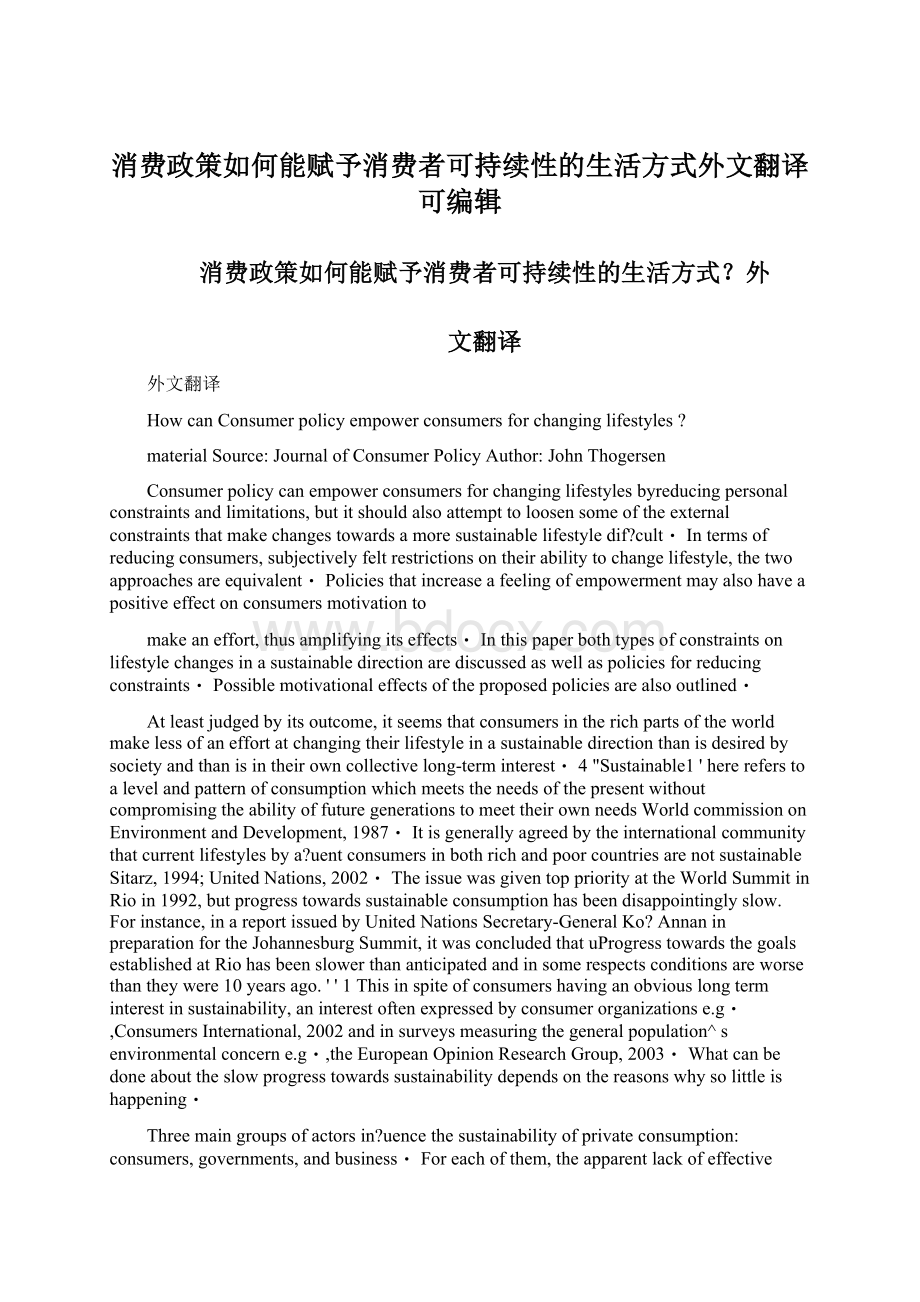 消费政策如何能赋予消费者可持续性的生活方式外文翻译可编辑.docx
消费政策如何能赋予消费者可持续性的生活方式外文翻译可编辑.docx
- 文档编号:4626369
- 上传时间:2022-12-07
- 格式:DOCX
- 页数:7
- 大小:22.62KB
消费政策如何能赋予消费者可持续性的生活方式外文翻译可编辑.docx
《消费政策如何能赋予消费者可持续性的生活方式外文翻译可编辑.docx》由会员分享,可在线阅读,更多相关《消费政策如何能赋予消费者可持续性的生活方式外文翻译可编辑.docx(7页珍藏版)》请在冰豆网上搜索。

消费政策如何能赋予消费者可持续性的生活方式外文翻译可编辑
消费政策如何能赋予消费者可持续性的生活方式?
外
文翻译
外文翻译
HowcanConsumerpolicyempowerconsumersforchanginglifestyles?
materialSource:
JournalofConsumerPolicyAuthor:
JohnThogersen
Consumerpolicycanempowerconsumersforchanginglifestylesbyreducingpersonalconstraintsandlimitations,butitshouldalsoattempttoloosensomeoftheexternalconstraintsthatmakechangestowardsamoresustainablelifestyledif?
cult・Intermsofreducingconsumers,subjectivelyfeltrestrictionsontheirabilitytochangelifestyle,thetwoapproachesareequivalent・Policiesthatincreaseafeelingofempowermentmayalsohaveapositiveeffectonconsumersmotivationto
makeaneffort,thusamplifyingitseffects・Inthispaperbothtypesofconstraintsonlifestylechangesinasustainabledirectionarediscussedaswellaspoliciesforreducingconstraints・Possiblemotivationaleffectsoftheproposedpoliciesarealsooutlined・
Atleastjudgedbyitsoutcome,itseemsthatconsumersintherichpartsoftheworldmakelessofaneffortatchangingtheirlifestyleinasustainabledirectionthanisdesiredbysocietyandthanisintheirowncollectivelong-terminterest・4"Sustainable1'herereferstoalevelandpatternofconsumptionwhichmeetstheneedsofthepresentwithoutcompromisingtheabilityoffuturegenerationstomeettheirownneedsWorldcommissiononEnvironmentandDevelopment,1987・Itisgenerallyagreedbytheinternationalcommunitythatcurrentlifestylesbya?
uentconsumersinbothrichandpoorcountriesarenotsustainableSitarz,1994;UnitedNations,2002・TheissuewasgiventoppriorityattheWorldSummitinRioin1992,butprogresstowardssustainableconsumptionhasbeendisappointinglyslow.Forinstance,inareportissuedbyUnitedNationsSecretary-GeneralKo?
AnnaninpreparationfortheJohannesburgSummit,itwasconcludedthatuProgresstowardsthegoalsestablishedatRiohasbeenslowerthananticipatedandinsomerespectsconditionsareworsethantheywere10yearsago.''1Thisinspiteofconsumershavinganobviouslongterminterestinsustainability,aninterestoftenexpressedbyconsumerorganizationse.g・,ConsumersInternational,2002andinsurveysmeasuringthegeneralpopulation^senvironmentalconcerne.g・,theEuropeanOpinionResearchGroup,2003・Whatcanbedoneabouttheslowprogresstowardssustainabilitydependsonthereasonswhysolittleishappening・
Threemaingroupsofactorsin?
uencethesustainabilityofprivateconsumption:
consumers,governments,andbusiness・Foreachofthem,theapparentlackofeffectiveactionforsustainabilitymaybeattributedtomotivationalaswellasability-:
relatedfactors・Inthispaper,thefocusisonunderstandingandin?
uencingconsumeractions・However,inordertounderstandtheconstraintsthatconsumersmustliveby,referencestothetwoothergroupsofactorsareunavoidable・
Itisoftenarguedthatconsumersthemselvescanmakeadifferencewithregardto?
andshouldthereforecarrytheirfairshareoftheresponsibilityfor?
thesustainabilityoftheirconsumptionpatterne・g・,NorwegianMinistryofEnvironment,1994;Sitarz,1994・Thisisbasedontheobservationsthatprivateconsumptionaccountsforalargeshareofresourceuseandoftheemissionofpollutantstotheenvironment,andthatconsumersdohavesomediscretionarypowerwithregardtothesizeoftheirindividualcontributiontoresourceuseandpollutione.g・,Olander&Th?
gersen,1995・Inlinewiththisreasoning,HansenandSchrader1997arguethatconsumerpolicy,andtheconsumermodelonwhichitisbased,shouldberevisedtore?
ectthatconsumershavean,atleastpartial,ethicalresponsibilityfortheconsequencesoftheiractions・
Althoughthecaseforconsumerresponsibilityisstrong,itisimportantthatitisnotusedtojustify'"blamingthevictinf'strategies,thatis,blamingconsumersforunsustainablelifestyleswhen4"macroconditionsexistwhichcanbeblamedforcontributingtotheproblemorconstrainingtheeffectivenessofindividualeffortse.g・,companiesthatdonotprovideecologicallyfriendlyproducts,governmentinactivity1'Roberts&Bacon,1997,p.89.Infact,hardlyanyonewilldenythatthereareexternalconditionsaffectingtheeffectivenessofanindividualconsumer'sactions,ifandwhenheorshestrivesforsustainability・Therelevantexternalconditionsareanextremelydiversesetoffactors,perhapstheironlycommonalitybeingthatontheirown,individualconsumerscandonothingaboutthem.
Somerelevantexternalconditions,suchastheclimate,evengovernmentsandindustrycandolittleaboutandothers,suchasculture,citylayout,andinfrastructure,theycanonlyin?
uenceinthelongrun.However,thereareotherimportantexternalconditionswhichgovernmentsand/orindustrycontroltoamuchhigherdegree,suchasthequalityofpublictransport,thesupplyandrelativepricesofenvironment-friendlyproducts,andtheavailabilityanduseofeco-labellingschemes・Hence,governmentsandbusinessesareresponsibleformuchoftheexternalconditionslimitinganindividualconsumersfreedomtochooseandact,andthereforetheyalsocarrypartoftheresponsibilityforsustainableconsumptionandproductione.g・,Stern,Dietz,Ruttan,Socolow,&Sweeney,1997.Mostgovernments,2atleastintheindustrializedcountries,alsoacknowledgetheirresponsibility・However,analysesoftheirpraxisrevealthatalthoughsomegovernmentsdobetterthanothers,ingeneralgovernments'verbalcommitmentasexpressed,forinstance,atinternationalconferencesandsummitsisonlyreluctantlyandtoalimitedextendtransformedintoactione.g・,Lafferty&Meadowcroft,2000.
Theeffortalsodependsontheconsumer?
smotivation,andnotallconsumersareequallymotivatedtochangetheirlifestyleinasustainabledirection,ofcourse・Somearesoengulfedbytheirownprivatelifeprojectsthattheyhavenoroomforconcernfortheenvironmentorothersocietalproblemsandmanywouldhatetogiveupspeci?
cenvironmentallyharmfulpractices,suchasdrivingagasguzzlingSUVorvisitingfar-awayvacationspotsbyairplane・BothEuropeanTh?
gersen,forthcomingandNorthAmericanDunlap,2002opinionpollsstronglysuggestthatthelevelofenvironmentalconcerniscurrentlynotthemostimportantlimitingfactorforchangingtheconsumptionpatterninasustainabledirection,however・AsIwillargue1ster,afeelingofhelplessnessoratleastlackofself-effcacywithregardtosolvingtheproblemsseemstobeofgreaterimportanceforthelevelofindividualmotivation.Therefore,themainfocushereisonconstraintsthatmightlimitconsumers?
abilitytoadoptasustainablelifestyleandonwaystoreduceimportantconstraints・
Aconsumerempowermentapproachtoconsumerpolicyischaracterizedbyastrongfocusonreducingconstraintsattheindividualleve1・3A1thoughthismakesalotofsensealsowhenthegoalistochangelifestylesinasustainabledirection,theoptionsarewider・Inparticular,consumerpolicyshouldalsoattempttoloosenexternal
constraintsandtoremove
perverse''incentivesMyers&Kent,1998thatmakechangestowardsamoresustainablelifestylediffcult・Intermsofreducingconsumerssubjectivelyfeltrestrictionsontheirabilitytochangelifestyleandtheirperceivedself-effcacy,thetwoapproachesindividuallyandexternallyfocused,respectivelyareequivalent・Ifpartofwhatislackingismotivation,italsoseemsreasonabletospeakaboutmakingtheconsumerempoweredtoful?
lhisorherresponsibilities・Inthisperspective,empowermentisnotonlyaquestionofcapabilities,butalsoofmotivation.Basically,apersonTsfeelingofempowermenthasimplicationsforhowhardheorshewillstrivetosolveenvironmentalandethicalproblemsthroughhisorherownbehaviouralefforte.g・,Ajzen,1988;Geller,1995;Guagnano,Stern,&Dietz,1995;Olander&Th?
gersen,
1995・Hence,policy
thatincreasesafeelingofempowermentor
self-effcacymayalso
haveapositiveeffectonconsumers'motivation
tomakeanefforte.g・,
Pelletier,Dion,Tuson,&Green-Demers,1999,thus
producingactivation
thatgoesbeyondthatdirectlyattributableto
loosenedconstraints.
Inthispaper
Ihavereviewedevidenceregardingtheneedfor
consumerempowerment,
andhowconsumerpolicycanassistinempowering
consumersforamoresustainablelifestyle・Theevidencesuggeststhatalthoughindividualconsumers?
especiallyintheindustrializedworld?
havesomediscretionarypowerovertheirconsumptionpatternandalthoughcurrentlifestylescontributetoresourcedepletionandenvironmentaldegradation,limitedabilitiesandrestrictedopportunities,incombinationwithnormsandincentivessupportingnon-sustainablepractices,makeitdiffcultevenforhighlymotivatedindividualstodoanythingradicaltoimprovethesustainabilityoftheirlifestyles・Andwhenitcomestotheimplementationoflawsandregulationsmakingstructuralconditionsmoreconducivetosustainableconsumptione.g・,introducingenvironmentaltaxes''thescaleofchangehasfallenwellshortoftherhetoric*'Lafferty&Meadowcroft,2000,p.381,asitwasputinonethoroughanalysisofgovernmentpoliciesinnineoftherichestcountriesintheworld・Hence,appealstoindividualconsumerresponsibilityinthisareaeasilygeta?
avourof'"blamingthevictim.''
Still,inajointeffortwheregovernmentsandbusinessesalsodotheirpart,empoweringconsumerstoovercometheirpersonallimitationsaswellastobemoremotivatedandinitiating,isundoubtedlyavaluable,probablyevenindispensable,partofanoverallstrategyforachievingamoresustainableconsumptionpattern.Theevidencepre
- 配套讲稿:
如PPT文件的首页显示word图标,表示该PPT已包含配套word讲稿。双击word图标可打开word文档。
- 特殊限制:
部分文档作品中含有的国旗、国徽等图片,仅作为作品整体效果示例展示,禁止商用。设计者仅对作品中独创性部分享有著作权。
- 关 键 词:
- 消费 政策 如何 赋予 消费者 持续性 生活方式 外文 翻译 编辑
 冰豆网所有资源均是用户自行上传分享,仅供网友学习交流,未经上传用户书面授权,请勿作他用。
冰豆网所有资源均是用户自行上传分享,仅供网友学习交流,未经上传用户书面授权,请勿作他用。


 转基因粮食的危害资料摘编Word下载.docx
转基因粮食的危害资料摘编Word下载.docx
